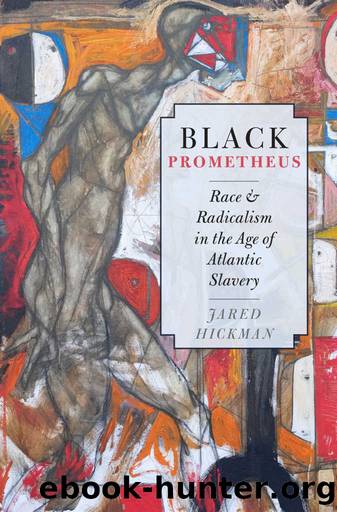Black Prometheus by Jared Hickman

Author:Jared Hickman [Hickman, Jared]
Language: eng
Format: epub
Publisher: Oxford University Press
Published: 2016-09-27T18:30:00+00:00
Imam Shamil, or the Modern Prometheus of Caucasus
The Caucasian fight for sovereignty afforded writers an ideal discursive detour from the black Prometheus, from the recognition of slave rebellion as the most foundation-shaking act of revolution. In much of the commentary on Shamilâs resistance, Prometheus was deployed as the obvious, indeed, local, genius of thisâmost literallyâCaucasian defense of liberty.
Travelers in the Caucasus during the period of Shamilâs resistance sought traces of the Prometheus myth in the regionâthese are the sources on which the London correspondent of The National Era drew for his discussion of slavery in Russia. Lascelles Wraxallâs English compilation of two German travelersâ accounts of Shamilâs Caucasus recites the Prometheus myth and suggests that it âstill lives in the memory of the inhabitants [of the Caucasus], who narrate it with a very few unimportant variations.â50 (Modern folklorists of the Caucasus often make the same move when noting the virtual indistinguishability of ancient Greek myths of Prometheus and the titans from local legends about the originary North Caucasiansâthe giant Narts who embody âthe spirit of rebellion and heroism.â)51 The 1837 English edition of Edouard Taitbout de Marignyâs Three Voyages in the Black Sea to the Coast of Circassia offers one such local variant of the Prometheus myth. Marigny relays the report of German traveler M. Tausch regarding a certain mountain in the Caucasus that gave off ânoxious exhalationsâ and contained âa frightful gulf, where sometimes loud sounds of chains and groans are heard. The Abazes relate that a man of their tribe said, that he had descended into it, and had there found a huge giant, who said to him, âOh, thou, inhabitant of earth ⦠what is going on above? Is the grass ever verdant there? Does peace reign in the families â¦â The Circassian having replied in the affirmative, he said, âIt is well; I am doomed to dwell here yet a long time.âââ Such a fantastic tale can only leave Marigny to state the obvious: âThis fable has a certain affinity with that of Prometheus, the traces of which I have been glad to find in the very country where the poets of antiquity had placed it. It proves to us that personage must have had an historical origin, on which it would, perhaps be possible to throw some light by carefully visiting the high chain of the Caucasus.â52 The London correspondent for The National Era, in his digest of work on the Caucasus, cites this passage, so it made its way directly to an abolitionist audience (âNo. IVâ). Ditson is even more specific: âI had heard ⦠that I would find howling horrors in the region of the Kasbek, provoked by the restless spirit of Prometheus, who was still chained there, with none of Ioâs race to set him free,â a detail the National Era correspondent also adopts (âNo. IVâ).53 Notably, Mount Kazbek loomed over the Georgian-Military-Highway that provided âRussiaâs lifeline to its possessions in Transcaucasiaâ and thus was a focus of guerilla action.54 Ditson thus
Download
This site does not store any files on its server. We only index and link to content provided by other sites. Please contact the content providers to delete copyright contents if any and email us, we'll remove relevant links or contents immediately.
| Anthropology | Archaeology |
| Philosophy | Politics & Government |
| Social Sciences | Sociology |
| Women's Studies |
Cecilia; Or, Memoirs of an Heiress — Volume 1 by Fanny Burney(31333)
Cecilia; Or, Memoirs of an Heiress — Volume 3 by Fanny Burney(30934)
Cecilia; Or, Memoirs of an Heiress — Volume 2 by Fanny Burney(30889)
The Great Music City by Andrea Baker(21318)
We're Going to Need More Wine by Gabrielle Union(18074)
Bombshells: Glamour Girls of a Lifetime by Sullivan Steve(13109)
Pimp by Iceberg Slim(12932)
All the Missing Girls by Megan Miranda(12752)
Fifty Shades Freed by E L James(12451)
Norse Mythology by Gaiman Neil(11883)
Talking to Strangers by Malcolm Gladwell(11879)
Crazy Rich Asians by Kevin Kwan(8351)
Mindhunter: Inside the FBI's Elite Serial Crime Unit by John E. Douglas & Mark Olshaker(7834)
The Lost Art of Listening by Michael P. Nichols(6474)
Enlightenment Now: The Case for Reason, Science, Humanism, and Progress by Steven Pinker(6406)
Bad Blood by John Carreyrou(5770)
The Four Agreements by Don Miguel Ruiz(5511)
Weapons of Math Destruction by Cathy O'Neil(5038)
We Need to Talk by Celeste Headlee(4870)
